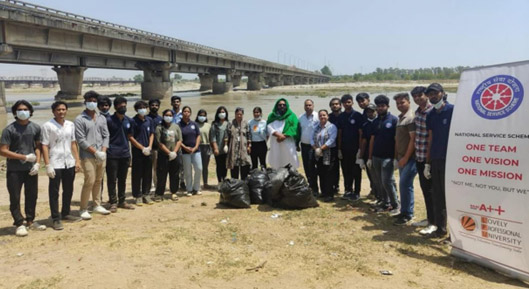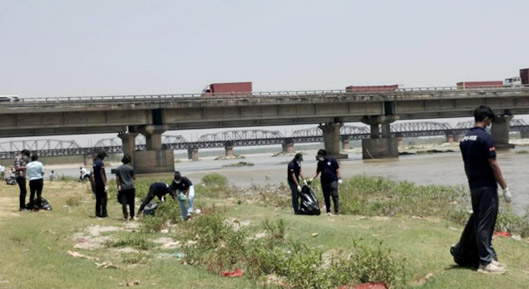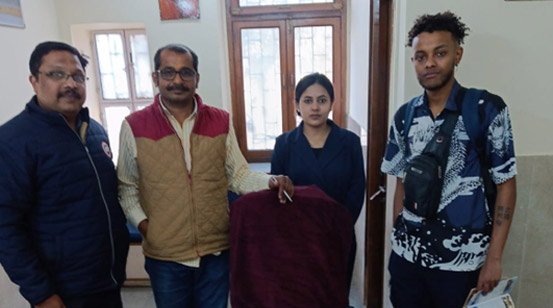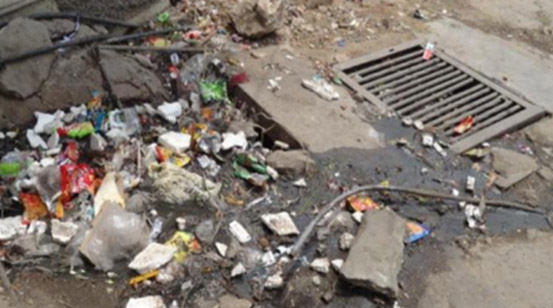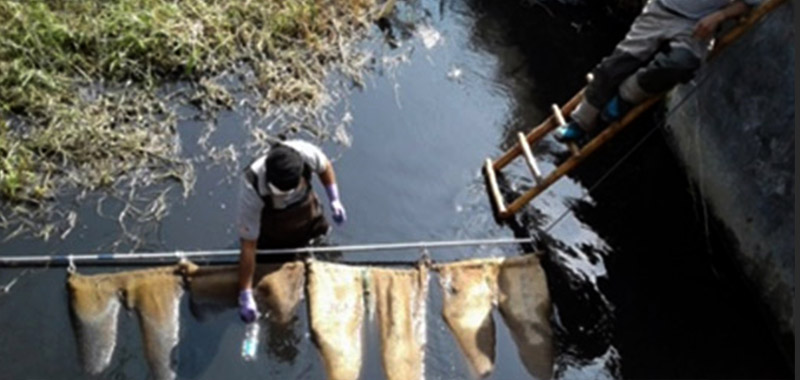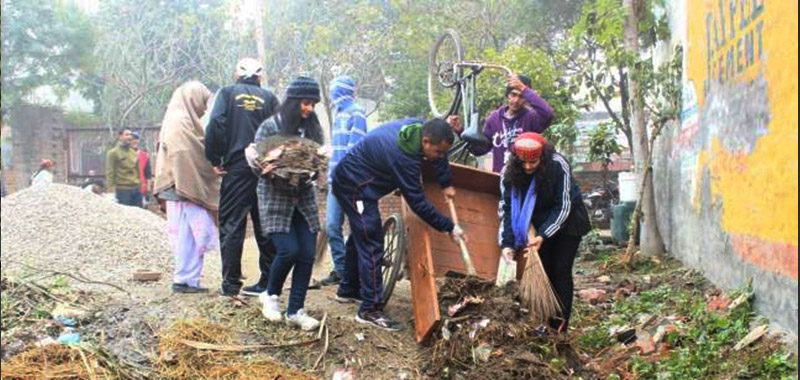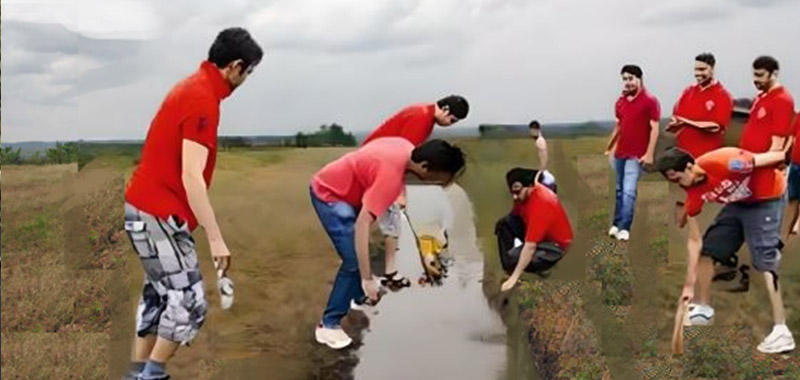LPU is dedicated to promoting water conservation beyond its campus, aligning with the broader goals of Sustainable Development Goal 6 (SDG 6) to ensure access to clean water and sustainable water management practices at both local and global levels. The university actively engages with various stakeholders, including community groups, industry partners, NGOs, and environmental organizations, to advance water conservation and climate change adaptation efforts off-campus.
Social Initiatives & Community Development Project:
The Citizens & Communities and their Environment in Relation to Water projects aim to understand the relationship between communities and their environment, particularly concerning water resources.
- Communities interact with their environment, particularly water
- Understanding on environmental assets (like water) play in shaping community dynamics and resilience
- Water-related challenges contribute to conflicts within and between communities
- Interconnected community and environmental resilience through sustainable water management
The research promotes sustainable management of water resources in local communities, ensuring that water conservation strategies are adapted to the specific needs and challenges of these communities.
Community Engagement and Collaboration:
LPU works closely with selected community partners, ranging from small community groups to larger organizations responsible for community regeneration and resilience. This collaboration focuses on:
- Community Water Conservation: Assisting communities in adopting sustainable water management practices, including water reuse, rainwater harvesting, and responsible water use for agricultural and domestic purposes.
- Environmental Resilience: Supporting communities in building resilience to water-related environmental challenges, including water scarcity, flooding, and the impact of climate change on water resources.
- Conflict Resolution: Addressing conflicts related to water access and management within and between communities, and promoting cooperative water conservation practices that benefit the entire community.
LPU’s efforts in off-campus water conservation reflect its holistic approach to addressing global water challenges, ensuring that its impact extends beyond the campus to benefit broader communities and ecosystems with such activities:
Outreach activities

Promoting Waterless Innovation
LPU students took to the streets to showcase the "Go Clean & Safe" initiative, highlighting their innovative water-less car wash concept. This outreach effort aimed to raise public awareness about water conservation, emphasizing the importance of sustainable practices in everyday life. By engaging the community in discussions and demonstrations, the students effectively communicated the significance of reducing water usage and adopting eco-friendly alternatives. Their commitment to environmental stewardship aligns with Sustainable Development Goal 6, promoting clean water and sanitation while inspiring others to join in the conservation movement.Sutlej River Revitalization
Students from Lovely Professional University spearheaded a clean-up initiative along the Sutlej River, one of Punjab's prominent rivers. This outreach activity involved collaborative efforts with the National Cadet Corps (NCC) to collect waste from the riverbed, showcasing their commitment to environmental stewardship. By actively participating in this "Clean Drive," the students not only contributed to revitalizing the river's ecosystem but also raised awareness about the importance of preserving natural water resources. This initiative aligns with Sustainable Development Goal 6, underscoring the university's dedication to ensuring clean water and sanitation for all.Udaipur Sewerage cleaning Strategy
LPU’s students outreach activity on Urban planning”Udaipur, Rajashthan” Official Approval for outreach activity on Urban planning. The Udaipur Development Plan-2044 outlines a comprehensive strategy to address the growing sewerage demands of the city. This report delves into the specifics of the proposed sewerage system expansion, encompassing crucial aspects like treatment capacity augmentation, pipeline network enhancements, and strategic considerations for future development.Addressing these deficiencies Clogged Drainage in the existing drainage system is crucial for improving stormwater management and reducing the impact of flooding on the city.
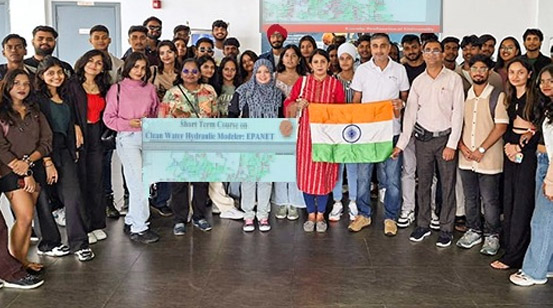
Campaign Empowering Water Management Skills
LPU is strongly committed to advancing social impact in line with the Sustainable Development Goals (SDGs), particularly SDG 6, which focuses on ensuring sustainable water and sanitation for all. As part of its outreach activities, the university's teaching group of experts delivers Short Term Course to registered participants from external organizations about "Enhancing Skills in Water Demand and Supply Management". This outreach activity enhance skills in creating water networks, using simulations to visualize water demand and supply, evaluating qualitative and quantitative uncertainties, understanding spatial and attribute data limitations, and analyzing water supply sustainability from a network operation perspective.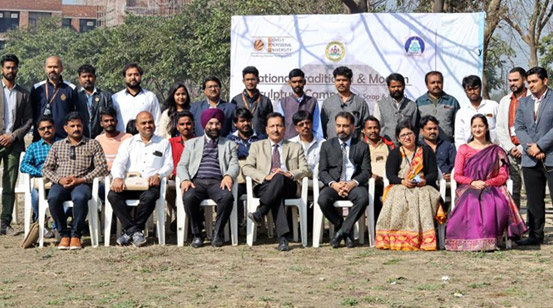
Mastering workshop on Water Management Techniques
As part of an open and collaborative campus outreach initiative, LPU hosted the "Water Utility Management Workshop" through HRDC, engaging external participants in advanced training. This hands-on workshop included practical exercises in water supply networks and hydraulics, data integration, and output analysis. Participants also learned to import GIS maps into EPANET for network design and develop both demand-driven and pressure-driven models. The training further introduced Qatium, an advanced water management platform, empowering attendees with cutting-edge tools for effective water utility management.Creek- cleaning Drive
Lovely professional university has adopted comprehensive approach towards off campus water conservation. The university is deeply committed to preserving the abundant biodiversity to its surroundings of campus and local areas, particularly in the near by creek. LPU actively promotes water conservation efforts beyond its campus through practical initiatives and active engagement with policy-making. Notably, LPU's social service team of experts has implemented a project involving the installation of water-cleaning net, beneath the root zones of local water body “creek”. This innovative approach has resulted in a remarkable 90% collection of waste from water flowing in creek.
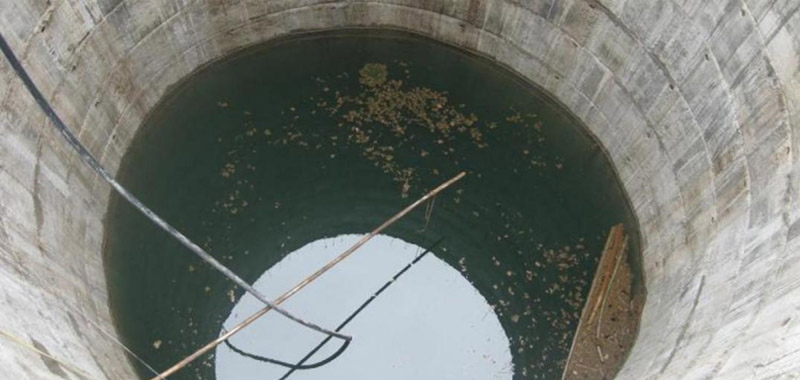
Collaborative Social Projects with state government on converting waste water into usable water
Apart from various initiatives in-campus, LPU is focused towards water cleaning projects in collaboration with the industry & governments with aim to assessing and mapping the groundwater contamination in the Punjab region by making use of satellite technologies, using Geographic information system (GIS) and machine learning technique, image processing techniques. LPU is directly involved in shaping water conservation policies, strategies, and management practices at both local and state levels. The university is also committed to educating and raising awareness about water conservation.
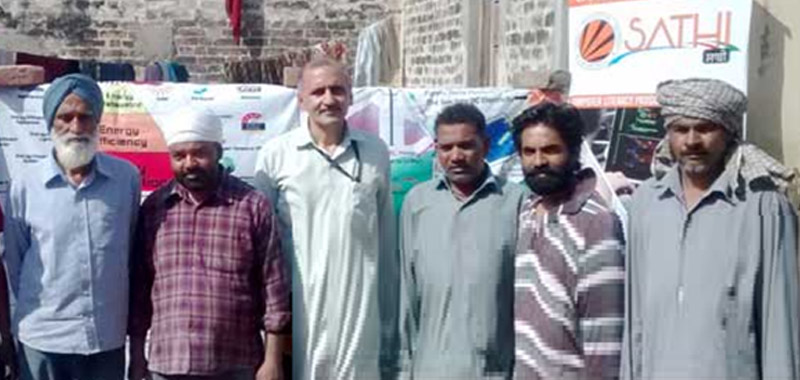
Community Awareness for Water Conservation
Event organized by students of Lovely Professional University, this event was driven by a commitment to raise public awareness within their community. The students took a pledge to educate villagers about the critical issue of water scarcity and how seemingly innocent daily activities can inadvertently contribute to the global water shortage, making it a challenge for people to access clean water for survival.
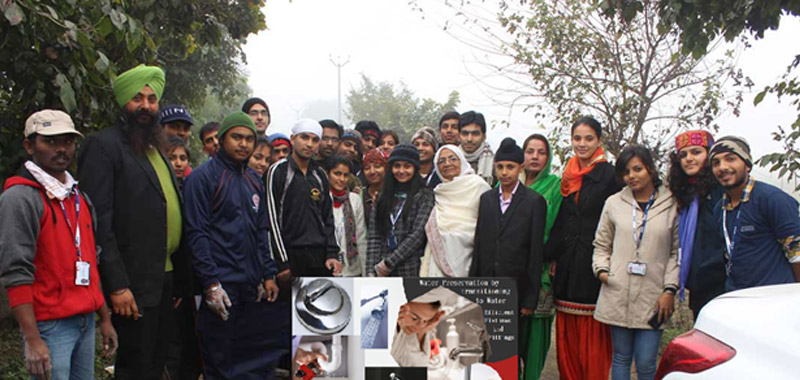
Water Preservation by transitioning to Water-Efficient Fixtures and Fittings
Event organized by the Student Organization Cell, Division of Student Welfare at Lovely Professional University, this event brought together students, university maintenance incharge and more than 100 community members. The aim was to raise awareness about the importance of water utilization by urging people to transition from traditional plumbing fixtures and fittings to water-efficient alternatives. These changes can significantly reduce water waste and lead to cost savings on water and electricity bills, which is particularly crucial in areas with high water production and supply costs.
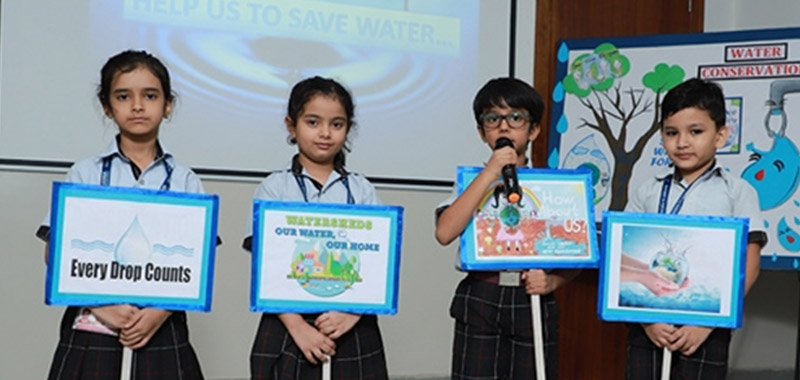
Water Conservation and Gardening Workshop for School Children
Event organized by the Student Organization Cell, Division of Student Welfare at Lovely Professional University, this event took place outside the university, in a local near by school. The "Water Conservation and Gardening Workshop for School Children" showcased the potential for education and hands-on experiences to nurture environmental awareness and responsible habits in young minds. By teaching children the value of water conservation and gardening, this event laid the foundation for a more sustainable and environmentally conscious future generation.
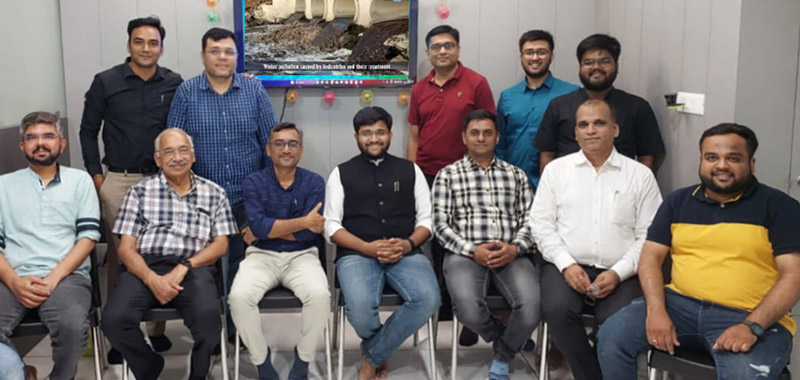
Industrial Pollution Awareness and Prevention Seminar
Event organized by the Student Organization Cell, Division of Student Welfare at Lovely Professional University, this event took place outside the university, where students and environmental science experts engaged with various industry owners in an industrial estate. The primary objective was to educate industrial stakeholders about the adverse effects of their activities, such as discharging oil, hazardous substances, and other pollutants into water bodies. The event aimed to raise awareness about the detrimental impact of industrial pollution on water quality, public health, and the environment, while also providing technical guidance on pollution prevention.
Educational Awareness to prevent entry of polluted water
- LPU promotes educational awareness to prevent polluted water entry, with expert faculty delivering a Short-Term Course on "Enhancing Skills in Water Demand and Supply Management" for external participants, bolstering water security and social impact.
- Through outreach initiatives, LPU’s HRDC hosted a workshop on preventing polluted water entry, offering hands-on training in water supply networks, GIS mapping, and EPANET for effective water management.
- LPU students organized the "Go Clean & Safe" campaign, promoting a water-less car wash concept to reduce water use and prevent detergent-laden wastewater from polluting natural water sources.
-
In collaboration with NCC, LPU students led a "Clean Drive" along the Sutlej River, raising awareness on waste reduction and its impact on preserving water quality, aligning with SDG 6 and local water security efforts.
Click here
Guidelines on water use and its discharge in campus
INTRODUCTION
Water is a blessing for human life and natural water resources are being exhausted to meet its increasing requirement since it doesn’t have a substitute. Therefore, recycling or reuse of water is important for sustainable development and to ensure the availability of clean water to future generations
Lovely Professional University thus has contributed in various ways and numerous efforts by initiating integrated efforts to ensure adequate infrastructure, processes and guidelines, in line with Government, for providing the sufficient and sustainable water facilities within Campus. Comprehensive and continuous efforts are made by the University to facilitate safe and affordable drinking water. In addition, efforts for the treatment of waste water produced in Campus and maximization its use also been made.
SCOPE
The scope of these guidelines is to provide a roadmap and guidelines with background and a broad conceptual framework for planning/implementing strategies for sustainable development that includes water management, conservation of water, water security and educational programs for increasing awareness.
OBJECTIVES
- To maximize the judicious use of water in the campus.
- To increase the awareness among campus population and nearby localities for the sustainable use and reuse/recycle of water
- To ensure the 24 X 7 availability of free and clean drinking water to all inside the campus.
- To ensure the sewage treatment as per the prevailing norms.
- To contribute towards upliftment of ground water table level.
- To establish and maintain water quality standards through pretreatment before it discharge that safeguard the ecological integrity of the water bodies.
GUIDELINES ON WATER USE ON CAMPUS
University must make dedicated efforts towards the provision of fresh water facilities as well as the treatment of water. For achieving clean water and sanitation, the University must introduce various processes and policies such as:+
4.1 Access to Free and Clean Water
- University must provide clean and free drinking water facility to the entire Campus population.
- There must be routine water audits and water quality checks from accredited or certified agency, to ensure the quality of water.
- The water filters must be cleaned/serviced regularly to ensure the un-interrupted supply of clean and safe water, from certified service providers.
- To ensure the minimum wastage of clean water, the automatic sensor-based urinal pot, semi-automatic minimum water usage push button taps, two button toilet flush water tanks, water saving spray jet nozzles etc. must be installed in Campus.
- The volume of water extracted from underground, aquifers, lakes, or any natural water body, for this purpose, must be recorded using water meters across whole University.
- For ensuring the adequate supply of clean water, University must organize awareness programs, seminars, workshops, plays campaigns etc. must be organized from time to time both within and outside the University campus, focusing on key indicators of clean water, water reuse, water security and management.
- University should emphasize the importance of conservation of water, water management, by implementing these strategies in the curriculum and daily activities of the university for sustainable development.
- University must ensure the proper utilization of overhead tanks for storing water and using it for drip irrigation, horticulture and agriculture.
- University must contribute towards the global mission of “Clean Water” by co- operating with local, regional, national or international bodies/NGOs/Governmental agencies, etc. to work on water security.
- A separate water treatment plant (Reverse Osmosis plant) can be installed for each block for supply of purified water.
- All the waste discharge from university must be pretreated to remove any hazardous and toxic material before discharge to environmental bodies. The treated water can be tested timely to ensure the quality of water being discharge and meet the prescribed standards before its discharge.
4.2 Treatment of Waste water
- Adequate number of Sewage Treatment Plants (STPs) must be installed at various location inside the Campus to treat the waste water.
- University will direct its efforts to optimize the capacity of the STPs for treating the waste water.
- University must focus on utilization of treated water for flushing the toilets.
- The waste water produced in the Campus must be disposed-off to the surroundings only after pretreatment of the same. This must be as per the Punjab Pollution Control Board and/or Central Pollution Control Board guidelines to protect human health and healthy ecosystems (both aquatic i.
e. freshwater as well as marine restrial ecosystems). - The treated water can be used for irrigation purposes, toilet cleaning, etc. and must take efforts to use gray water.
- The waste water expected to be rich in microbial content must be disposed-off after pretreatment as per Bio Medical Waste Management guidelines laid down by Govt. of India.
- The quality of treated water must also be examined on a timely basis to ensure the proper functioning of Sewage Treatment Plants.
- The sewage treated water can be used for irrigation of trees, using The Karnal Technology.
- University must ensure that the discharge water may not affect the aquatic ecosystem.
4.3 Rain water harvesting
- University must provide rain-water harvesting bores within the Campus to ensure the recycling of rain water and contribute towards sustainable development.
- The volume of rain water harvested must be measured using water meters and the consequent effect of ground water recharging must be monitored.
- University must ensure the prevention of polluted water, harmful water or any polluted water from accidents and incidents in surroundings/University to clean water and must take steps in this direction.
- The collection of rain water must be collected through surface runoff collection from terraces that is connected to a rainwater recharge well by a pipe line.
- Ensure the discharged rainwater does not pose health or safety risks to the public, environment and water bodies.
4.4 Other Initiatives
University must take following initiatives for the water use with in the campus:
- Implement building standards to minimize water usage and maximize water reuse. The quantity of reused water must be recorded.
- Implement water conservation method like drip irrigation, leakage repairs, and condensate recovery.
- Implementation of water recycling techniques including dissolved air flotation, biological treatment, granular activated carbon, softening, disinfection, deionization and filtration etc.
- Initiate plantation such that the plants (Drought resistant plants) require lesser water for growth and sustenance.
- Initiate in-designing of the campus roads with saucer drain section to collect water from the road network and from the paver’s walkways.
- Initiate by installing solar water pumps to run the water pumping system in the campus.
- Implementation of water filling in overhead water tanks with a time-controlled pumping system at individual campus buildings.
- University must carry out collaborative research to address issues on aquatic (freshwater and marine) ecosystem.
- Compliance with government guidelines for the water discharge to protect the ecosystem.
- Ensure the 24 x 7 supply of quality potable water.
- In order to minimize water usage, students are encouraged to use buckets instead of showers.
- University increase vegetation cover in order to prevent top soil erosion.
- Prioritize source reduction, recycling, and treatment before water discharge.
- Avoid discharging near sensitive ecosystems, wetlands, or water bodies with fragile habitats.
These guidelines must be reviewed periodically considering the data stats and analysis to overcome the system lags and ensure the sustainable supply of clean water.



